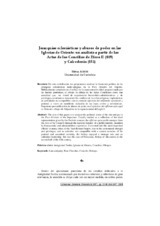Jerarquías eclesiásticas y abusos de poder en las Iglesias de Oriente: un análisis a partir de las Actas de los Concilios de Éfeso II (449) y Calcedonia (451)

Ver/
Autor
Acerbi, Silvia
Editor
Universidad de Córdoba, Servicio de PublicacionesFecha
2007Materia
BishopsEast-Churches
Late Antiquity
Councils
Antigüedad Tardía
Obispos
Concilios y sínodos
Iglesias de Oriente
METS:
Mostrar el registro METSPREMIS:
Mostrar el registro PREMISMetadatos
Mostrar el registro completo del ítemResumen
The aim of this paper is to analyze the political status of the late-antique in the Pars Orientis of the Imperium. Usually studied as a reflection of the ideal representation given by the Patristic sources, the officium episcopalis emerges from the Acta of he Councils through the realistic features of a public identity, moulded by bureaucratic and administrative experience. Converted into the most important official in many cities of the East Roman Empire, due to his economical strength and privileges, and to activities not compatible with a correct exercise of his pastoral and sacerdotal ministry, the bishop enjoyed a strategic role and an unlimited leadership: this was the case of Dioscorus, bishop of Alexandria in the second half of the fifth century. En esta contribución nos proponemos analizar la fisonomía política de las jerarquías eclesiásticas tardo-antiguas en la Pars Orientis del Imperio. Habitualmente estudiado en el reflejo de la representación ideal proporcionada por las fuentes patrísticas, el obispo se dibuja en las Actas Conciliares como una autoridad que, en virtud de experiencias burocrático-administrativas y de privilegios económicos, trasciende los confines de la esfera religiosa, implicándose en actividades no compatibles con un correcto ejercicio del ministerio sacerdotal y pastoral, a veces en manifiesta violación de las leyes civiles y eclesiásticas. Prepotente personificación de abusos de poder en el ejercicio del officium episcopal es Dióscuro, obispo de Alejandría en la segunda mitad del siglo V.
